When SHTF and security is a concern, the best firearm is the one you have with you–so long as its loaded and you know how to use it.
While that notion holds true if disaster were to strike tomorrow, you have time to consider the logistics of your firearms preparation before a threat becomes imminent.
To that end, some ammunition is considered more viable and effective for survival use than others, though specifically can be considered the best. In a survival scenario, availability is key when it comes to weapons and ammunition selection.
Thus, the following five types of ammunition have been selected primarily for their high availability in normal times, which is likely to linger on when SHTF.
1. .22LR
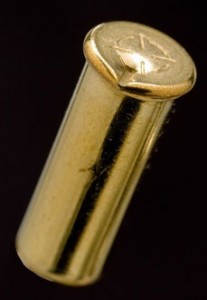
The generic 40-grain high velocity round can be found for a dime a dozen, while more powerful rounds are also tailor-made for mid-sized game hunting, self-defense, and competition shooting.
Its availability, variety, and affordability are what make the .22LR round a must-have for long-term disaster survival, when other variants of ammo may become a scarce and expensive commodity. Accordingly, .22LR cartridges are lightweight enough to carry 1,000 rounds (or more) in the event you have to bug out.
Hunting for your own food becomes a necessity when your stores run dry in the aftermath of a crisis. Fortunately, the .22LR is among the most trusty ammo for small-game hunting, whether chambered through a bolt-action, lever-action, single-shot, or semi-automatic rifle. Long-barreled .22 caliber pistols may also be serviceable for small-game hunting with the right variety of cartridge in the right conditions.
As a relatively small round, the .22 is not the best self-defense ammunition, but when SHTF you have to use what you have to defend what’s yours. If you stock up on high-performance rounds, your abundance of ammo will at least give you a numbers advantage when it comes to disposable ammunition against a potential threat.
2. 12-gauge
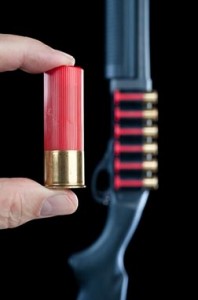
Though some brands produced for specific shooting purposes can be pricey, generic 12-gauge rounds are relatively inexpensive and widely available.
When it comes to efficient ammo consumption, most people prefer pump-action shotguns to the often complicated and slower-loading semi-automatic.
12-gauge shotguns have been a staple for hunters of both four-legged and flying game for decades, and have thus proved their practicality for use in a survival situation. Bird shot shells will take down most flying fowl and small game, while buckshot and slug shells can be used against deer and other bigger game.
12-gauge shotguns are also widely carried by members of the law enforcement and military communities, as they are among the most formidable firearm in close-quarter scenarios. When loaded with buckshot, a 12-gauge can mow down pretty much any target within 10-yards, while slug rounds will extend the shotgun’s range and accuracy.
3. 9mm
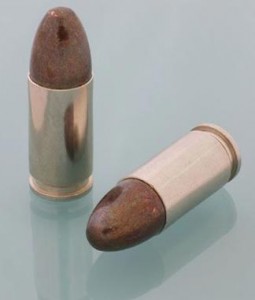
However, if we’re going on availability alone, the 9mm wins the race when it comes to long-term supply in a post-disaster survival situation.
Like the .22 rimfire, there are a lot of options to choose from when it comes to 9mm rounds. 115-grain FMJ and 124-grain NATO rounds will likely remain the most readily available and inexpensive in the dawn and aftermath of a disaster, and both are favored for their reliability when loaded in older-model pistols and submachine guns.
Though most often found in handguns, there are some pistol-caliber carbine rifles that employ the use of 9mm rounds. While a pistol is a must have in any layered defense, a 9mm carabine rifle provides an additional platform for your 9mm rounds to be used for more effective self-defense.
Accordingly, they’ll do just as much justice as the best .22LR against small game for emergency hunting use.
4. 5.56 NATO
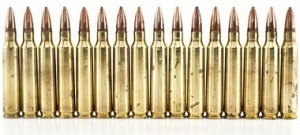
The fact that weapons factories, military installations, National Guard stations, and thousands of residential homes are currently filled with 5.56 rounds, there isn’t likely to be a shortage on availability any time soon.
The 5.56 NATO has been field-tested and battle-approved to be a highly effective anti-personnel round at a range of about 300-meters, depending of the barrel length of the gun.
When it comes to post-disaster survival, 300-meters is quite a distance to attempt hitting any target, human or animal. While you’ll find some relief in knowing you’ll have your perimeter covered, your efforts should be focused on designating targets within 100-meters, both for hunting and self-defense. Though advanced optics will improve your accuracy, a military-style 5.56 rifle with basic iron sights can easily take down a buck at a moderate range in the hands of a steady shooter.
Overall, you know you’ve got your hands on a reliable and versatile round in the same ammunition used by the most formidable military in the world.
5. .308
The .308 Winchester–a shortened version of the .30-06–is a great alternative to the .22LR and 5.56, a jacketed version of the .22, for hunting and all-around survival purposes. .308 rounds are available in weights between 147 and 180 grains and offer significantly more muzzle velocity and stopping power than .22 and .223 rounds.
The .308 Winchester is essentially a civilian version of the 7.62x51mm NATO round, though the two are not identical and the rounds are not always interchangeable.
The .308 has a reputation for reliable accuracy, and thus has long been favored by competition rifle shooters, in addition to a plethora of hunters.
From a 24-inch barrel, .308s have an effective range of about 800-yards. Though they would be on the small side for the largest of North American game like moose and brown bear, which would be best hunted using .300 Magnum rounds, .308 Winchesters are suited for hunting most big game from bucks to bobcats.
Most AR10–and some AR15–platform rifles chamber .308 Winchester rounds, making them equally suitable for defense purposes. Though the recent ammo shortage scares have many concerned over the future availability of rifle ammunition, .308 rounds seem to have promising odds for the long-term. As a commonly used sporting and military rifle/carbine round, .308s are manufactured by dozens of North American and European companies alike.
Though you may prefer a grade of ammo not mentioned above, keep in mind that you will likely have to pay more to stock more in normal times and look harder to maintain your stores when SHTF. Because they are already so widely used in the law enforcement, military, hunting, competition, and recreational shooting communities, the five types of ammo mentioned above are considered to be incredibly useful and versatile selections for disaster survival.
Regardless of your favorite(s), make sure you store and rotate your ammo appropriately to maintain its effectiveness and keep your shooting skills sharp.


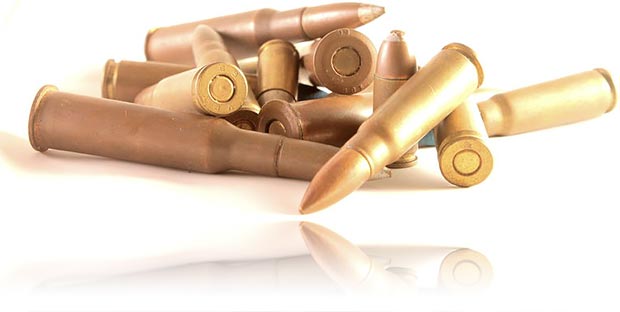

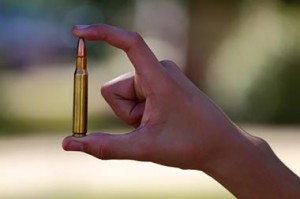



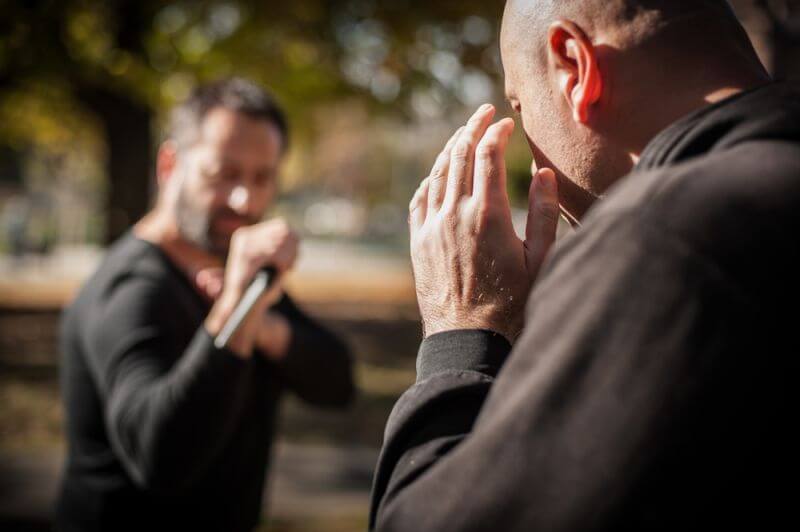
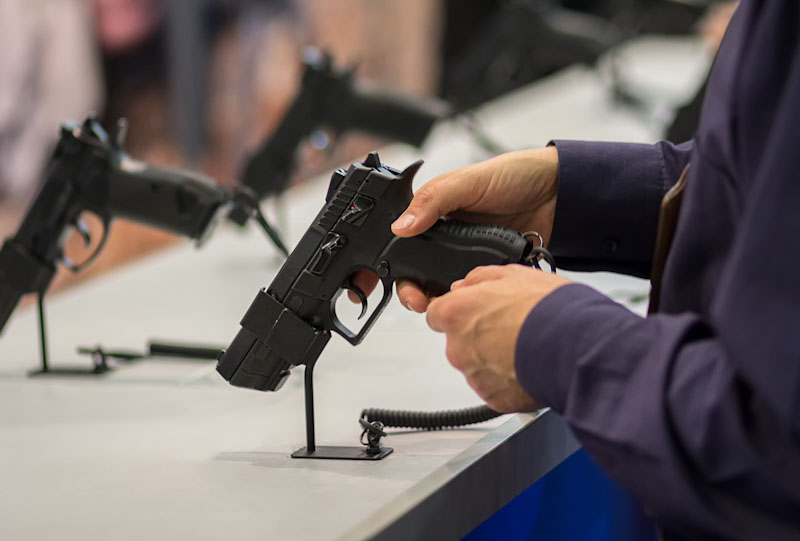

jon | February 25, 2014
|
It must be pointed out that there is some factual errors in this document.
“For those looking for a round that falls somewhere between a .22 and a 5.56, the .308 Winchester is a prime choice that packs quite a punch.”
The 308 is a significant step up from 5.56. The numbering system for each round is different.
Both 5.56 and 308 have a basis in military (NATO) use. The 308 being essentially a Civilian version of 7.62. This ammo is almost, but not quite interchangeable.
“The .308 delivers more stopping power than a .300 Magnum and is on par with the .30-06.”
Again… The 300 mag offers a significant step up in power and recoil over both cartridges. The 308 was designed to replicate the performance of the 30-06 in a shorter round better suited to what was then the new automatic cycling rifles. This enabled a shorter action, requiring less weight to be carried by infantry.
These rounds however are all good choices, readily available.
Hope that helps!
Robert | February 28, 2014
|
While I agree the 22LR is probably the best survival round, there are some in accuracies, first the 7.62×51 is way more powerful than the 5.56×45, though most comparisons say the opposite. They are both tested with a 16 inch barrel when the 7.62×51 for a 24 or 26 inch barrel. The powder for different calibers are blended for the length of the barrel to get the best velocity/accuracy and when you use a shorter barrel the performance drops drastically. The other one is that the 308 is not more powerful than the 300 mag. The 300 mag is the most popular round used for Elk and Moose ! Also the 7.62 is the military version of the.308 Winchester! The M1 used the 30.06, the ballistics of the 308 Winchester are almost the same and the military was impressed with the 308 so the 7.62×51 (the same dementions as the 308 Winchester) was born and was used in the M14.
robert | September 2, 2014
|
The writer of this article has changed it some to correct inaccuracies but still not completely accurate. Not saying he is trying to mislead but still inaccurate. I say again the 7.62 nato is the military version of the .308 Winchester ! The military did not develop this round, Winchester did! The military just calls it by it’s metric measurement, and yes they are identical and they are interchangeable. The only difference is the max pressure, the military loads the round to 200 psi less max chamber pressure than Winchester! My job while in the military was a weapons expert. Not trying to discredit the author just trying clarify.. As a side note the 5.56 noto was also not developed by the military, it was developed by Remington, it is a .223 Remington, it’s metric measurements are 5.56×45, the military just loads it to a higher pressure than Remington.
will | July 5, 2017
|
Hi, Robert,
I am tring to learn, and decide on he types of weapons I will need on my homestead. (When I retire 4 years from now). Question would the higher pressure of the military 7.62 rounds have a detrimental effect on hunting rifle spec for 308 rounds. I am not looking to break the bank so lets say for instance a Ruger American. Thanks, for your help.
Leo | March 1, 2014
|
Family and friends settled for the 22lr, 9mm, 223 (AR), 7.62 (AK), 308 (Snipping), an12 gauge 00buck and rifled slugs. This way we can all support each other in ammo and weapons.
Kukriking | March 2, 2014
|
Very wise selection if I do say so myself. The best part of your comment is that you got everybody on the same page….major accomplishment. I only wish I could get my family just to agree to prepping…they all think it’s unnecessary and think we’re (preppers) all crazy. I tell them to watch the movie “Take Shelter”.
John | April 3, 2014
|
00 buck has so few pellets that often the slug is a better choice. A better general purpose anti-personnel round is #4 buck (more pellets = greater coverage). #4 buck and slugs should cover your defensive and large game needs, while some light hunting loads are good for birds and small game.
Robert | March 25, 2014
|
You have the wrong impression on the 308, the308 Winchester was around long before the military adopted it and called it the 7.62×51. The military liked the 308 because it was shorter than the 30.06 but with near the same ballistics! You are right about it being more powerful than the 5.56×45, much more powerful and the 300 Winchester Magnum is way more powerful than the .308 or the 30.06
Robert | March 25, 2014
|
Actually the 308 Winchester and the 7.62×51 are interchangeable.
jim | April 12, 2014
|
Good article – a few errors but your intent is good. What most people miss when they get into caliber wars is that it doesn’t matter THAT much. People have killed brown bears (why anyone would want to do that is beyond me) with .22LRs and human attackers have been shot multiple times with .44 magnums and kept going. Shot placement is king.
Since for the most part a round is a round, it makes sense to pick basic, standard, available rounds that everyone stocks. Look, if you’re in Afghanistan, every BOLO for a potential suicide bomber tells you to watch for “a white Toyota Corolla”. It was such a constant it became a running joke, we’d laugh about it every time we heard it because every car was a Toyota and half of them were Corollas.
Toyota Corollas are popular in places like Afghanistan because they run forever with no maintenance and because everyone drives them, so everyone has parts and knows how to fix them.
If buying a firearm for survival (rather than a dick-measuring contest at the range…have you seen my new .50 cal revolver…LOL) you’re better off with Toyota Corolla calibers (9mm, 38/.357, .22, .223, 12 ga, .308 etc) than with Lotus calibers (.45 GAP, .41 mag, .300 winchester, 45-70, .454, etc).
At the end of the day, the difference in performance is a detail. The difference in availability is everything.
John | April 12, 2014
|
Commonality is certainly very important, but is not the only factor to consider. Although the, as you call them ‘Lotus’ calibers, should be avoided, functionality has important validity in your choice too. ‘Chevy’ calibers, perhaps?. .223 and 9mm are very common, but they are of limited effectiveness for most purposes. The less available but much more effective 30 calibers (.308 or even .30-06) and .45 ACP would be better choices. Even the 7.62×39 would be more effective than the .223 although not up to .308/.30-06 levels.
Of course, functionality is not the only factor as well; commonality must be considered. Both factors go hand-in-hand.
Note that this consideration is for PRIMARY weapons/calibers. I would always ensure I had a secondary weapon capable for firing the .223 and 9mm and possibly 7.62×39 because they are so common. And if I had special circumstances which would best be served by a ‘Lotus’ caliber, and could afford it without impact to ‘more important’ preparations, I’d have that as well.
Joe Cox | February 25, 2014
|
I like your site… clear, concise and well written!
Pingback:Just Measures Coin Shop » TODAY’S HEADLINES 2/26/2014 | February 26, 2014
|
Pingback:The Top 5 Ammo Types for Your Survival Guns | TheSurvivalPlaceBlog | February 26, 2014
|
James | February 27, 2014
|
Good attempt. At least you’re trying to get awareness out there. A little research could go a long way in the future, though, and gain you more credibility.
Kukriking | February 27, 2014
|
I’d have put the AK round (7.62×39) in there somewhere. Even if you had to make the list the ” Top SIX Types…” especially since most small arms experts say ” If it was the ‘end of the world’ (aka SHTF) and I could only have one gun, it’d be the AK47.” I’m no expert but I’d have to agree, it’s the one gun I’d never want to be without. VERY reliable AND tons of ammo available. Accurate enough, too.
frank | February 27, 2014
|
The 7.62 by 39 is also used by more military’s than any other caliber. Probably the most common bullet in the world. Also one of the cheapest for it’s size.
Gerald hayler | February 27, 2014
|
There have not been any .22LR on the shelves or on the internet for less than $10 for at least a year. Any over $10 per box are extremely rare. Consider yourself lucky if you can find any low cost .22LR in 2014.
Ronald Morley | February 28, 2014
|
Your comment about the .22LR is absolutely correct. It has become somewhat more available and less expensive over the last six months (at least here in northern AZ). However, the most recent batch at the local gun shop sold out in a couple of hours for $70/brick (500 rds.). The folks at the shop don’t know when they’ll get more in. The interesting thing is that I can shoot my centerfire rifles and pistols less expensively than my .22’s – a distinct reversal of history.
John | February 28, 2014
|
I don’t see the price for .22LR coming down at all, ever. I hate to say it, but I don’t see any reason for it to come down. Gun sales continue to increase, so the demand for more ammo will continue to increase…basic “supply and demand”. I see more and more people are finally waking up to the idea of prepping and newbies usually go for the easiest gun to handle. At first, I called it price gouging, but when prices have stayed this high for this long, they’re here to stay.
Don | February 27, 2014
|
I agree with Jon’s corrections on 2/25/2014 and would offer one more. In the photo – 5. .308, I am pretty sure that the photo is of a 30-06 rather than a .308 as the case length looks too long to be a .308.
RAYAKE | February 27, 2014
|
I would have added the 45ACP//7.62×39//30-06//44mag.,,then you would have had enough stoping power for all game..
Dav | February 27, 2014
|
Mostly correct but author gives it up that he is a novice firearms person and a better author. 300 mag is much more power than either the 30.06 or 308 which are essentially similar in power and performance. Although the 308 is a more modern cartridge the 30.06 is still popular and can be found in every corner of the country. If only one choice when SHTH, I think 9mm, plentiful, common, good balance between hunting power, self defense and cheap, A pistol and a carbine one ammo would cover many situations. If no carbine a long barreled pistol. The old west cowboys knew this and commonly used a revolver and a ‘winchester’ in 45 long colt, same theory, close up pistol power and in a carbine aka short rifle a decent range and fair power for man or beast. I also agree the 7.62×39 used in the AK47 is a worthy combination. Yeah good luck on finding 22 LR thanks to BHO, the best ammo salesman ever was.
William | February 27, 2014
|
Thanks for pointing out the “misinformation” in his article.
K9 | February 28, 2014
|
What do you guys think of the .30-.30? This is what I use for hunting, and these rounds are also very available.
don | March 6, 2014
|
30-30 is fine, if its your game bagger, and works for you. It has the rough equivalent to the power of the 7,62x 39, AK round. Like you said, ammo is available, so that is a plus.
I am sure glad I had the foresight to buy ammo back before the price and availability issues arouse. I
Bo Cappella | February 28, 2014
|
“The generic 40-grain high velocity round can be found for a dime a dozen, ” you say?
Really? For the last few years it’s well over a dollar a dozen, if you can even find any. The lowest I’ve seen at gun shows in Florida is 50 bucks a brick (500 rounds) and I paid $65 for a brick of sub-sonic last show: 13 cents a round!
LameBear | February 28, 2014
|
” For those looking for a round that falls somewhere between a .22 and a 5.56, the .308 Winchester is a prime choice that packs quite a punch. ”
The author apparently knows little about light munitions.
Farmer | August 11, 2019
|
He said he was sorry
Daniel | February 28, 2014
|
I was agreeing with you up to the point you rated a 308 as more powerful than a 300 mag. That is when I realized you know little or nothing about firearms. The 308(7.63 NATO) is a shortened version of a 30.06 and gives about the same performance with less powder. The shorter cartridge allows the use of a shorter action. The 7.62 and the 306 are the same cartridges, but do not fire 5.56 in a .223 chamber. The 5.56 is loaded with the bullet further out and if fired in a .223 rifle bad things can happen.
Kukriking | February 28, 2014
|
7.6″3″ NATO? Not sure I’ve heard of 7.63…three!? And what’s 306? Never heard of those. I hope they’re typos. Hey, look…let’s give this guy Cody a break. Alter the 1st correction (comment by Jon), it seems like everybody else is just rubbing it in. Maybe y’all should read the others’ comments and chill on the Codymeister. Dyaaamn. Now go shoot your Mosin and relax…or your WASR…or maybe the HK, or…
kg1321 | February 28, 2014
|
The .308 or the 7.62×51 seems to have a problem with broken shells. I own an inch patter FAL that fires 7.62 or .308 rounds. However, in the last couple of years I have had problems with shells breaking. May be one in 50-60 rounds, but enough to be unexpected. Anybody have the same problem?
Robert | March 25, 2014
|
The problem is not with the ammo, I think your head spacing might be off. You should not fire it till you get it checked out.
kg1321 | March 25, 2014
|
So far, it’s only the .308s that break in my FAL. 7,62×51 fires flawlessly. I think there is something to the taper.
Ximena | April 2, 2014
|
The artificial meakrt inflation of full-autos and the gun control regime involved has successfully made me not want to get one.However if the NFA and Hughes Amendment were to magically disappear you bet your ass I would be the first in line at a gunsmith to convert them to full-auto. Ill go against the grain here and say full-auto can be a useful feature. Does that mean I will use it every time I shoot? Of course not but I believe in the philosophy of its better to have it and not need it than to need it and not have it. If full-auto was useless then why do gun manufacturers of assault rifles still add the full-auto feature if they are useless?? Why does our military and police forces still have that feature on them if useless? Why did British soldiers in the Falkland War ditch their L1A1 s for the Argentine full-auto FAL’s?There is a time and place for full-auto rather than to declare it useless. Why do you think the government still makes them nigh impossible to get unless you have the money with a squeaky clean record?A right not exercised is a right denied especially those here who don’t mind being denied a function a lot of their rifled originally came with but banned from government tyranny.
John | April 2, 2014
|
Yes, full auto has its uses, but outside of those circumstances (rare in non-military scenarios and the equivalent), the ‘lure’ of full auto tends to ‘discourage’ accuracy.
When do you ‘need’ full auto? 1) to provide cover fire while you or compatriots move to a better position. 2) When being rushed by a multitude. 3) When the attacking force is moving in under the cover of darkness (night vision would usually be a more effective tactic) or smoke.
Other than this sort of usage, the tendency is to use full auto when not necessary because it appears to be ‘better’ and possibly is even ‘fun’. The problem is that full auto not only prevents accuracy for the follow up shots, but encourages not aiming for the first shot. I heard somewhere that 20,000 rounds were expended in Viet Nam for each enemy casualty inflicted.
Then of course there are the problems with ammo – paying for the supply up front, and then having to repeatedly cease fire while you reload. And if you have to move, carrying the supply.
I would not have one even if they were unregulated AND given away ‘free’ (sold for the same as or less than the equivalent semi-auto). Now if the ammo were ‘free’ too, I’d consider getting one for fun.
Eliza | April 3, 2014
|
This is a really ingetlilent way to answer the question.
To Hell and Back | March 4, 2014
|
The 7.62 x 51 Nato and the Win. 308 are different in that although they have the same bullet diameter, the cases are not the same. The 7.62 was manufactured with a taper on the case so that it would eject from a hot machine gun barrel instead of jamming when fouling from propellent burning got critical. The Win.308 is a civilian round designed for hunting in bolt action rifles and has a straight case. Both rounds have the same ballistics which is why the military liked it. But a 7.62 Nato has to be forced into a .308 chamber and after firing swells up even tighter. Do not buy surplus 7.62 for your Win.308; and do not plan on using .308’s in your M14 except
in a short term emergency. Keep your guns clean…..
kg1321 | March 5, 2014
|
Thanks for the info. I didn’t realize that the actual shell is that different.
Robert | March 25, 2014
|
It’s not !
Robert | March 25, 2014
|
It’s not, the case is the same.
Robert | March 25, 2014
|
If what you said were true you would have to force the 308 into the military rifle, and if the military rounds case were more tapered then it would be sloppy in the 308 Win chamber and possibly split the case when fired.
To Hell and Back | April 3, 2014
|
I guess you are going to have to learn the hard way. When you are laying in the mud on your back trying to kick the bolt open with your foot and instead you just break the cartridge rim off, and then you have to take a cleaning rod and try to ram the stuck cartridge out, all the while the bad guys are getting closer, I won’t be the one who said, ” I told you so.” Been there and done that. Always try your ammo before you buy,
the farm that is.
robert | September 2, 2014
|
Have measured the cases, have you, if you had you would see that they are exactly the same. Don’t just go with what someone tells you check it out for yourself. Get a set of digital calipers and measure the cases and you will see for yourself. There are semi auto rifles that are not military guns and they are chambered in .308 Win. They get very hot when fired rapidly but they do not stick in the chamber !
william | October 5, 2017
|
there are differences in the cases of the 7.62 nato and the 308 win. The 7.62 has a thicker case to allow for streching in the milatary spec firearms. The military firearms also have about a .006 in longer head space than the 308 hunting rifle.. The reason for this is simply because of the military rifles need to be able to fire 7.62 ammo found all around the world. While the 308 win will fire in the 762 weapon. the extra head space could cause the thinner sheel cases to stretch and break causeing possible jamming. The 7.62 will fire in the 308 win hunting rifle, but the slightly longer 7.62 round might not load easily and have to be forced to chamber. Using go and no-gauges to measure headspace of your particular rifle is the best way to determine if your favorite hunting rifle will reliably shoot the 7.62 ammo
John Morgan | March 6, 2014
|
With the price and availability of 22 LR, being what it is, I’ve done more buying and shooting of 7.62×39, also had to buy the AK to shoot with. It’s been quite a fun and economical firearm to shoot, combined with easy maintenance and battle proven reliability, this becomes a no-brainer.
John | March 27, 2014
|
9mm and .223 are common, yes, and having weapons which fire them is useful, but they are not nearly as effective as the .45ACP and .308/.30-06 which they ‘replaced’. The ‘new rounds’ are small and fast and ‘pointy’ which means they are better suited to penetration than transmitting energy to the target. There are more cases of people being shot with these rounds and still being able to continue aggression than with the older, bigger rounds. The primary reason the military went to these rounds were that they were smaller and lighter; that is it was easier and cheaper to ship it, and each soldier could carry more. Probably decided by bean counters rather than weapons experts.
For an exhaustive study on guns for survival, check out ‘Survival Guns’ by Mel Tappan.
In a perfect world, you’d have guns and ammo both in the most useful and the most common choices. Of course, in that perfect world, you wouldn’t need them.
Kukriking | March 27, 2014
|
It’s best to have ALL of those cals. for a survival/bug-in situation. Sometimes you might NEED the smaller, lighter rounds to WOUND, which would draw in the other enemies (to lend aid) then you can take out ALL of them with the heavier cal. rounds. What do you think of the idea that .223 FMJ tumble on entry to create a comparable wound channel as a JHP ?
John | March 27, 2014
|
The tumbling can indeed provide more stopping power, but there is a cost – accuracy. If a bullet is tumbling or even wobbling through the air, it is not going where you mean it to.
‘Wounding’ attackers? Really? 1) Do you really want to change back and forth between weapons while being attacked? 2) Do you think that people who would attack you without just cause are moral enough to worry about their wounded? At least not until they have achieved their goal – your stuff and/or your life. 3) Do you want to take the chance that the attacker you wounded will be able to resume firing?
Kukriking | March 27, 2014
|
I said it tumbles AFTER entering the body. I don’t think they tumble before unless you have highly mismatched bullet weight and twist rate. As far as switching from lighter gun/round to heavier would waste some time, I was really thinking of not being alone and my partner(s) would be using the other caliber. The original intention the military had for the .223 WAS to wound and then kill the assisters, but you do have a point that in desperate lawless times, the attackers might fend less for each other. Thanks for the reply.
John | March 28, 2014
|
I’m pretty sure the bullet only tumbles when it hits a target slightly off center. Otherwise, how could it tumble unless it hits something which deflects it; most guns and ammunition work pretty hard to achieve linear stability?
I’ve never fired a military M16 so can’t personally verify it, but I’ve been given to understand that the barrel was a bit oversize to encourage the bullet to wobble so it WOULD have a greater chance of tumbling.
If you are being attacked, and have a chance to disable an attacker, it would seem to border on insanity not to take it. The only reasons to use a less effective weapon would be either you don’t have anything better, or you have a superior tactical advantage and don’t want to waste the ‘good stuff’, or the attack continues and your primary weapon is out of action or ammo. That said, if the attackers are ‘out of range’ or have ‘good cover’, it MIGHT be useful to fire a few rounds from a bolt action .22 to encourage an underestimation of your defensive capabilities, and draw them out of cover or within range.
Kukriking | March 28, 2014
|
All EXCELLENT points. Especially if your partner uses a .22lr first so they’ll UNDERESTIMATE your defenses…then overwhelm them with the heavy stuff…brilliant! ( btw, my heavy cal. is a .450 Bushmaster- 250 gr. ballistic tip for med/ long range and a .45ACP (Dan Wesson) for CQ.)
Now, you heard they made the actual bore on the M16 greater than .223 intentionally… to make the bullets flight unstable…intentionally…?…
I don’t know man…I can’t believe that because that would make it less accurate and they’re very accurate.
The ONLY thing I remember (memory’s gettin’ baaad) is that the bullet enters straight in, then, because the high velocity tip SLOWS DOWN dramatically upon impact of the victims skin ( it doesn’t have to hit a bone to tumble), THEN the rear end of the bullet continues at the SAME velocity making the projectile go end over tip and keeps tumbling. That’s what I heard. I could be wrong… That’s one reason I brought it up in this forum… To see if those physics are correct, or if someone more knowledgable could set me straight.
…btw, I’d like to lay down 660 grains of .50cal. smackdown right off the bat and remove all doubt..Whatya say…YEEUH!!
MOΛΩΝ ΛΑΒΕ !!!! GET SOME !!
Pingback:Storing and Replenishing Your Ammunition Stockpile for Survival | May 15, 2014
|
Pingback:Ammo Storage DOs and DON’Ts | TheSurvivalPlaceBlog | May 19, 2014
|
Pingback:Ammo Storage DOs and DON’Ts | Patriot Rising | May 20, 2014
|
CW | May 25, 2014
|
I love my black powder rifles 45/70 and 45/90 and having a custom 45/140 built also own 15 flintlock and 33 percussion , powder is still readily available as are caps you can legally own 50 lbs. black powder per person ATF gets real pissy when they catch you with 200 pounds of 4x powder.
I have a idea for ant entrapunuer
Osito | May 25, 2014
|
I understand the logic of the task the author was given, which I believe to include “covering the widest range of audience with the most used standards.” However, I reject that premise, for several reasons:
1. We live in different conditions. I live in the Missouri Ozarks. Most game is taken at 40 yards or less, and most hunting locations are heavily wooded or “brushy”.
Pingback:Top Survivalist Guns | survival guide | October 7, 2014
|
Pingback:Top 5 Ammo Types for Your Survival Guns - US Crisis PreppersUS Crisis Preppers | February 9, 2015
|
Pingback:Why to Have Ammunition in Outdoor Sports? | besthuntingammunition | June 9, 2015
|
Pingback:Obama Is On The 2nd Amendment Warpath | August 1, 2015
|
David | August 30, 2015
|
I couldn’t agree more.
I Iove my .45ACP, but it can’t hold a candle to the 9mm’s universal availability.
I like the .30 WCF, but the .308 is the 9mm of CF rifle cartridge.
The .22LR is my one concern. You need 3,000 calories a day and a lot of protein while under stress – like a SHTF scenario. How many rabbits?can you shoot will bugging out?
Dave | November 9, 2015
|
Noticed that the 20 ga. was not mentioned. I purposely purchased an H & R Pump 20 ga. for one(note ONE) of our SHTF weapons. Reason: No kick, good accuracy on follow-up shot, inexpensive, 4 plus one, and may not kill my neighbor either. Also, OK for a Lady and small frame shooter. I just had to make sure I accumulated enough ammunition for this odd-ball. All members of your family unit should have a primary weapon(rifle or shotgun), and a secondary(handgun) along with extra magazines. Standardized the secondary ammo except for my own which is my coveted 1911 45 cal. (8 plus one). God Bless All.
vocalpatriot | September 15, 2017
|
For that matter, a .410 has a place as well..
Pingback:How Obama's Gun Control Will Affect Ammo Prices + The Best Survival Ammo Types for Survivalists | Survival Frog Blog | January 15, 2016
|
Lyle | January 21, 2016
|
One other 12 gauge advantage that most people miss is the fact that you can buy 2 3/4″ 12 gauge flares, I keep 3 in the hollow buttstock of my 12 gauge along with a survival kit and some extra rounds, I also have a chiappa little badger in .22LR rigged into the ultimate survival .22 and my old trusty BLR 81 in .308 with a flip down scope and iron sights, it’s a hard decision on what I would take with my bugout bag so I have ammo for each in the bag(use the ammo I don’t need on firestarter, and a whistle), I assume I will just figure it out when SHTF based on the situation.
Desert storm 1.0 | April 15, 2016
|
My honest opinion on this subject is this:
1. 30-06
2. 7.62×39
3. 45 acp
4. 9 mm
5.* 22 wmr aka 22 magnum
* I choose the 22 mag over the 22 lr because “I” believe the 22 mag is a more reliably manufactured round then the 22 lr. The 22 lr is so mass produced and due to the inherent problems with the manufacturing process of rim-fire ammunition, I believe the 22 mag is manufactured much better. Mainly because it is not mass produced like the 22 lr.
I don’t enjoy having to wonder if the 22 lr is going to fire when I pull the trigger, and I have had countless failures with many brands of 22 lr.
At the time I posted this message; I have had 0 (zero) failures when I have fired the 22 mag.
This is just my honest opinion and experience. It does not reflect the opinions or experiences of anyone else.
John the serial killer | June 22, 2016
|
I was considering a .357 revolver because you can also fire a .38 special. That way you have twice the chance of finding ammo if you have 2 types of rounds
John | June 23, 2016
|
That’s a decent choice. full power .357 is useful for defense and hunting game up to deer in size, while light .38 special loads are decent for small game. They make shot shells for that caliber too, which are useful for snakes. I have not tried them to see if they are practical for birds. The .44 Magnum/Special can be even better for most uses (.44 Mag for hunting big game, .44 special for defense and very light .44 special for small game) and has shot shells available as well.
.38 and .357 used to be very common, but probably are less so now, eclipsed by the popularity of 9mm and .40. Although more effective, .44 ammo is bigger, heavier, more expensive and rather more difficult to find.
If I was going to depend on the .357, I would be tempted to have two – one with at least a 6″ barrel for maximum range and a short barrel “pocket” one for last ditch defense. Don’t forget the speedloaders.
Noble Gunnz | December 30, 2016
|
carbines are available in these revolver calibers. If you reload, this is a very versatile combination. And the brass last through many cycles. I use them until they split.
Kemp Pheley | January 19, 2017
|
I enjoyed this article, and see the logic in it. I do believe the lowly .22 LR will be my cartridge of choice. It will kill deer-sized game and smaller, and larger with well a placed shot. Also during a SHTF circumstance medical care may be non-existent so the always irrational choice of charging a position defended by a 10/22 would be less appealing. Besides, once the cities empty and all the der are gunned down, a 40 grain bulletwill leave more to eat after a bird or small furry critter is taken than being drilled by a .308. So, I guess we end up with what we have for as long as we can survive, and good luck to all.
vocalpatriot | September 15, 2017
|
I’m confused.. It’s obvious that this author doesn’t know much about the topic. Why write about something you know nothing about?
Pingback:Storing Ammo: A Guide For Preppers | Survivopedia | October 2, 2017
|
iptv server | September 13, 2018
|
Hello
Nice share.
I consider the most stable free cccam are those from Fishbone cccam
I would like to see more posts like this
Thanks
Proteus | August 11, 2019
|
Thanks Cody. Those were my choices, but you inadvertantly started a dick measuring contest.